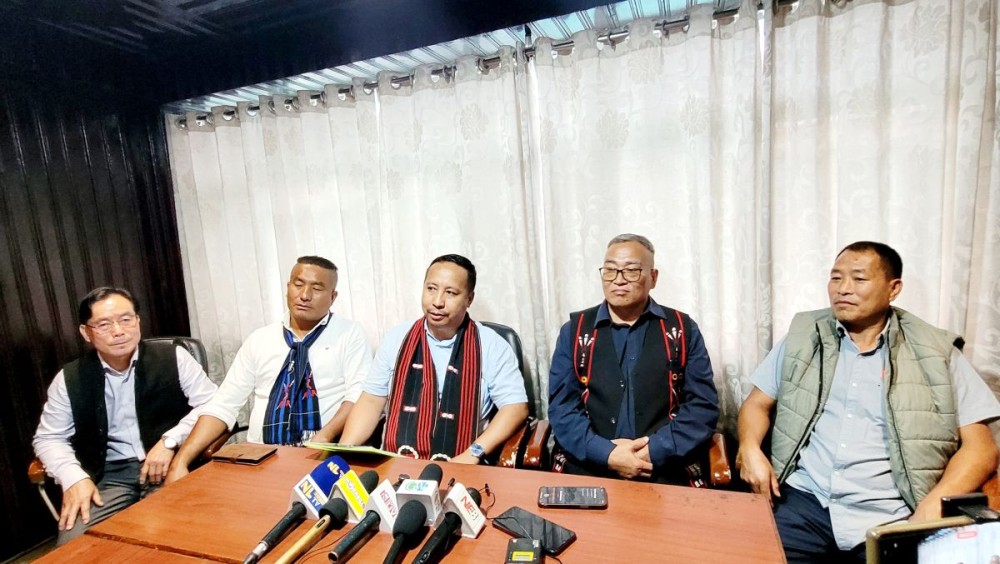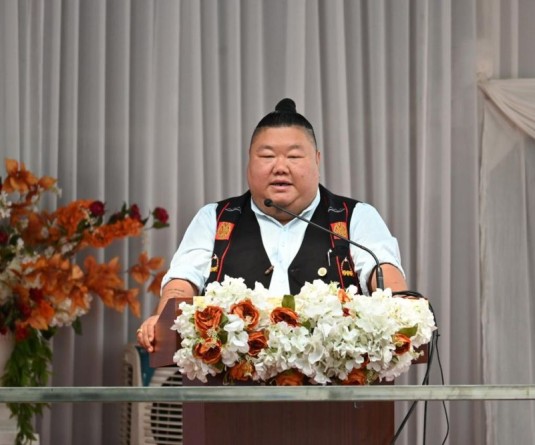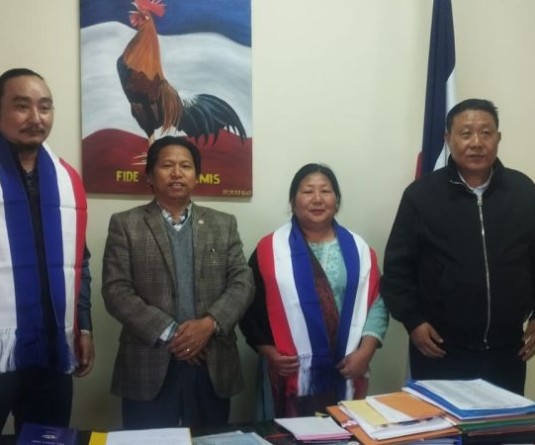Members of the Five Tribes CoRRP addressing media persons following their meeting held on August 9 at Urra Restaurant, Kohima.

To abstain from all government functions as 3rd phase agitation
Morung Express News
Kohima | August 9
The Five Tribes Committee on Review of Reservation Policy (CoRRP) has rejected the Nagaland government’s decision to include members of civil society organisations (CSOs) in the newly constituted Reservation Review Commission.
Addressing media persons after a meeting with youth and student bodies here today, CoRRP convenor Er Tesinlo Semy, while appreciating the constitution of the Commission, said, “We are not happy with the composition of the Commission.”
The state Cabinet, in its meeting on August 6, decided to constitute a Commission with representatives from the Eastern Nagaland People’s Organisation (ENPO), Central Nagaland Tribes Council (CNTC) and Tenyimia Union Nagaland (TUN).
However, CoRRP has rejected the inclusion of CSO members, stating, “Government has included the civil society organisations in the composition of the Commission, which we do not accept.”
As part of its third phase of agitation, Semy said CoRRP, along with all its frontal organisations, has decided to abstain from any government function, including the Independence Day celebration.
He maintained that the Commission should be an independent and impartial body, arguing that the inclusion of CSO members might compromise the neutrality of the review process. The Committee has therefore insisted that the body comprise only retired or serving government officials or bureaucrats.
Member Secretary GK Zhimomi said the idea of setting up the Commission was not CoRRP’s original demand, but an outcome of the June 3 meeting with the state government chaired by Deputy Chief Minister for Home, Y Patton. The government proposed setting up an independent Commission, which CoRRP agreed to in principle on June 12, he said.
While the composition was announced on August 6, Zhimomi said CoRRP had made it clear from the beginning that CSOs should not be included, adding that the Commission must be independent “to have an impartial and fair assessment of the entire reservation policy.”
He termed as “wildly imaginative” the statistics cited by government spokesperson and Power Minister KG Kenye, who said the composition of government employment was 64 per cent from the five tribes and 34 per cent from the ten backward tribes.
“The figure is way beyond the mark, not even borderline,” Zhimomi said, adding that CoRRP has its own data, which will be revealed at an appropriate time.
“As a government spokesman and as an honourable minister, one should not indulge in such wild figures, which will provoke the situation,” he added.
Asked if the Committee would hold discussions with tribes currently availing of the backward quota, Zhimomi said it was the government’s duty to take the views of both sides and arrive at a fair deal. “We welcome the constitution of the Commission, but we are vehemently against the composition, which includes the CSOs,” he reiterated.
While accepting the six-month timeframe for the Commission’s work, Zhimomi asserted that any delay beyond that would be unacceptable. He added that the state government should implement the recommendations immediately upon submission and “should not wait for the outcome of the census, which they keep repeating.”
“Otherwise, if the state government insists on linking the reservation review outcome with the census, then we demand that the reservation be suspended till such time,” he said.
On the possibility of further agitations, CoRRP said the decision to abstain from government functions should be understood as “non-participation” and not a “boycott.”
The demand for a review of Nagaland’s reservation policy intensified after five tribal apex bodies, under the banner of the Committee on Review of Reservation Policy (CORRP), submitted a joint memorandum to the state government recently.
They contended that the policy, in place since 1977, no longer reflects the current socio-economic and educational realities of the various communities in the state. CORRP held demonstrations in various districts on May 29 and July 9.
When introduced, the policy provided 25 per cent reservation in non-technical and non-gazetted posts for seven tribes designated as‘backward’ on the basis of educational and economic disadvantages and their limited representation in state services. The reservation was intended for a period of 10 years.
Over the years, the quota increased to 37 per cent — comprising 25 per cent for seven Eastern Nagaland backward tribes and 12 per cent for four other backward tribes in the state.





